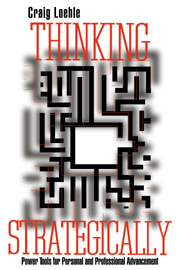Book contents
- Frontmatter
- Contents
- Acknowledgements
- Introduction
- PART 1 Component skills of strategic thinking
- 1 Strategic creativity
- 2 Discovery as a process
- 3 Strategic problem solving
- 4 Reality check
- 5 A matter of style
- 6 Attitude: The inner strategist
- 7 Strategic thinking exercises
- PART 2 Strategic thinking in practice
- Summary: The strategic thinker
- Literature cited
- Index
4 - Reality check
Published online by Cambridge University Press: 24 September 2009
- Frontmatter
- Contents
- Acknowledgements
- Introduction
- PART 1 Component skills of strategic thinking
- 1 Strategic creativity
- 2 Discovery as a process
- 3 Strategic problem solving
- 4 Reality check
- 5 A matter of style
- 6 Attitude: The inner strategist
- 7 Strategic thinking exercises
- PART 2 Strategic thinking in practice
- Summary: The strategic thinker
- Literature cited
- Index
Summary
In previous chapters, the process of discovery and the harnessing of our mental machinery in the service of discovery, problem solving and invention were discussed. By definition, when creating something new or solving a novel problem, we are stepping somewhat into the unknown. Clearly, in such cases we cannot look up the proper answer in the back of the book. It is not always clear and evident, however, that the discovery or problem solution is correct, useful, or the best. For an artist or composer it is only necessary that the product be pleasing to the author and/or the public. No further test is necessary, in spite of the presumed central role critics give themselves. In other realms of endeavor, however, it is essential that some type of test be used, some reality check, to verify the solution arrived at. This is particularly critical for complex systems, as is discussed in Chapters 5–7. There are two types of test that we may apply. First, we may be somewhat confident of the product of our work if we can be sure that the problem-solving process itself did not lead us astray. In this case we cannot be sure that our result is correct, but we can assert that we did not make any obvious blunders. This is an internal reality check. Second, it is useful to check, if possible, our results against some objective standard. This is an external reality check. These checks are discussed next.
- Type
- Chapter
- Information
- Thinking StrategicallyPower Tools for Personal and Professional Advancement, pp. 60 - 81Publisher: Cambridge University PressPrint publication year: 1996



